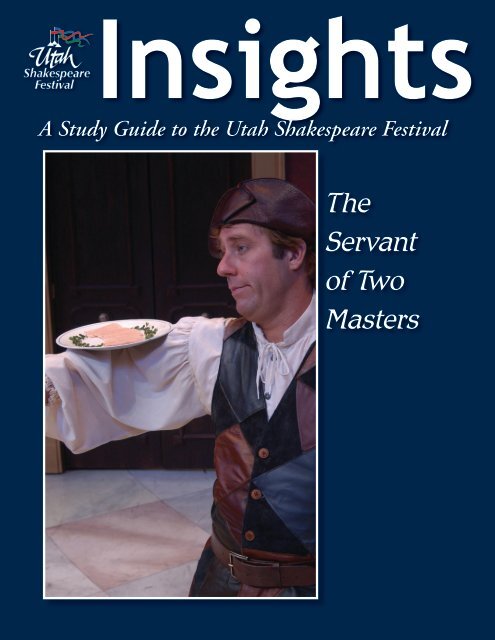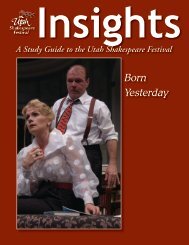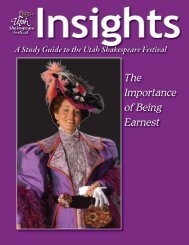The Servant of Two Masters - Utah Shakespearean Festival
The Servant of Two Masters - Utah Shakespearean Festival
The Servant of Two Masters - Utah Shakespearean Festival
Create successful ePaper yourself
Turn your PDF publications into a flip-book with our unique Google optimized e-Paper software.
Insights<br />
A Study Guide to the <strong>Utah</strong> Shakespeare <strong>Festival</strong><br />
<strong>The</strong><br />
<strong>Servant</strong><br />
<strong>of</strong> <strong>Two</strong><br />
<strong>Masters</strong>
<strong>The</strong> articles in this study guide are not meant to mirror or interpret any productions at the <strong>Utah</strong> Shakespeare<br />
<strong>Festival</strong>. <strong>The</strong>y are meant, instead, to be an educational jumping-<strong>of</strong>f point to understanding and enjoying the<br />
plays (in any production at any theatre) a bit more thoroughly. <strong>The</strong>refore the stories <strong>of</strong> the plays and the<br />
interpretative articles (and even characters, at times) may differ dramatically from what is ultimately produced<br />
on the <strong>Festival</strong>’s stages.<br />
Insights is published by the <strong>Utah</strong> Shakespeare <strong>Festival</strong>, 351 West Center Street; Cedar City, UT 84720. Bruce C.<br />
Lee, communications director and editor; Phil Hermansen, art director.<br />
Copyright © 2011, <strong>Utah</strong> Shakespeare <strong>Festival</strong>. Please feel free to download and print Insights, as long as you do<br />
not remove any identifying mark <strong>of</strong> the <strong>Utah</strong> Shakespeare <strong>Festival</strong>.<br />
For more information about <strong>Festival</strong> education programs:<br />
<strong>Utah</strong> Shakespeare <strong>Festival</strong><br />
351 West Center Street<br />
Cedar City, <strong>Utah</strong> 84720<br />
435-586-7880<br />
www.bard.org.<br />
Cover photo: David Ivers in <strong>The</strong> <strong>Servant</strong> <strong>of</strong> <strong>Two</strong> <strong>Masters</strong>, 2003.
<strong>The</strong> <strong>Servant</strong> <strong>of</strong> <strong>Two</strong> <strong>Masters</strong><br />
Contents<br />
Information on the Play<br />
Synopsis 4<br />
Characters 5<br />
About the Playwright 6<br />
Scholarly Articles on the Play<br />
<strong>The</strong> Politices <strong>of</strong> Self Interest 8<br />
Replacing Farces with Comedies 10<br />
<strong>Utah</strong> Shakespeare <strong>Festival</strong><br />
351 West Center Street • Cedar City, <strong>Utah</strong> 84720 • 435-586-7880<br />
3
Synopsis: <strong>The</strong> <strong>Servant</strong> <strong>of</strong> <strong>Two</strong> <strong>Masters</strong><br />
<strong>The</strong> play begins in the Venetian house <strong>of</strong> Pantalone, where a party is underway to celebrate the<br />
engagement <strong>of</strong> Clarice, daughter <strong>of</strong> Pantalone, to Silvio, son <strong>of</strong> Doctor Lombardi. As the wedding<br />
agreement is being signed, the hilarious and confused Truffaldino enters to announce the arrival <strong>of</strong> his<br />
master, Federigo Rasponi <strong>of</strong> Turin.<br />
This news comes as an amazingsurprise to all, since Federigo is believed to have been killed in a<br />
duel with Florindo, his sister Beatrice’s lover. <strong>The</strong> problem arises from the fact that Federigo had originally<br />
been promised Clarice’s hand in marriage. <strong>The</strong> truth, however, is the supposed Federigo is actually<br />
Beatrice in disguise, come from Turin to claim the dowry owed by Pantalone to her brother, if he were<br />
alive. (Confused yet! Wait, it will all work it’s way out.)<br />
To Clarice’s horror, her father feels obligated to honor his commitment to the supposed Federigo.<br />
Clarice refuses to comply, while Sylvio, spurred on by his pontificating father, strives to maintain his<br />
claim to Clarice’s hand. <strong>The</strong> wedding, however, is cancelled.<br />
Brighella, the innkeeper, recognizes Beatrice, despite her disguise, but promises to keep her identity<br />
a secret and becomes her accomplice in her mission. Here Truffaldino meets the housemaid,<br />
Smeraldina, and falls in love with her. (And there’s still more!)<br />
Later, on the street, the servant Truffaldino is approached by Florindo who, having recently escaped<br />
from Turin after killing Federigo, is seeking a servant himself. Truffaldino accepts Florindo’s <strong>of</strong>fer,<br />
determining that if he is clever he can serve two masters and easily double his income. From the hotel<br />
Florindo sends Truffaldino to check for his mail. Beatrice (disguised as Federigo), who is also at the<br />
hotel, sends him to check her mail as well. As fate would have it, Truffaldino mixes up the letters and<br />
gives Beatrice’s letters to Florindo, who as a result learns that his lover is in Venice and sets out in search<br />
<strong>of</strong> her.<br />
Back at Pantalone’s house, Beatrice, still in disguise as Federigo, reveals her secret to the distraught<br />
Clarice. Pantalone sees the two shake hands and takes it to mean that they have agreed to wed and sets<br />
out to tell Doctor Lombardi.<br />
Eventually, through a series <strong>of</strong> comic mishaps and mix-ups, Beatrice and Florindo come to believe<br />
that the other is dead. Beatrice, grief-stricken, abandons her disguise and flees the house. Having discovered<br />
Beatrice’s true identity, Pantalone tells Lombardi that the marriage between Silvio and Clarice<br />
is still possible since Federigo is actually a woman! Fate again intervenes and brings the suicidal Beatrice<br />
and Florindo together in a chance encounter. Overjoyed, they plan to return together to Turin and buy<br />
Florindo’s freedom.<br />
n the end, all <strong>of</strong> the couples are set to be happily married. Florindo asks Pantalone for permission<br />
for his servant, Truffaldino, to marry Clarice’s maid, Smeraldino. Clarice says that this is impossible,<br />
because Smeraldino is promised to Beatrice’s servant. Trufaldino, in order to marry Smeraldino, confesses<br />
that he is, indeed, a servant to two masters.<br />
4<br />
<strong>Utah</strong> Shakespeare <strong>Festival</strong><br />
351 West Center Street • Cedar City, <strong>Utah</strong> 84720 • 435-586-7880
Characters: <strong>The</strong> <strong>Servant</strong> <strong>of</strong> <strong>Two</strong> <strong>Masters</strong><br />
Clarice: Daughter <strong>of</strong> Pantalone, Clarice was originally promised to Federigo, whom she disliked.<br />
However, he is now dead, so at the beginning <strong>of</strong> the play she is planning on marrying her true<br />
love, Silvio.<br />
Florindo: Beatrice’s lover, Florindo is rumored to have killed Federigo in a duel in Turin. He flees<br />
to Venice to seek his beloved Beatrice.<br />
Dr. Lombardi: Silvio’s father, Dr. Lombardi’s self-absorbed pontifications are a source <strong>of</strong> constant<br />
irritation to all those around him.<br />
Pantalone: Clarice’s father, Pantalone is motivated almost entirely by the acquisition <strong>of</strong> money<br />
and goods. He would have preferred that his daughter marry Federigo, whom he considered a<br />
“better catch.”<br />
Smeraldina: Clarice’s maid, Smeraldina is strong-willed and lovely. She is also the object <strong>of</strong><br />
Truffaldino’s affection.<br />
Beatrice: Sister <strong>of</strong> Federigo Rasponi, Beatrice comes to Venice disguised as her brother and hoping<br />
to acquire the dowry owed to Federigo by Pantalone.<br />
Brighella: Friend <strong>of</strong> the Rasponi family, Brighella is the owner <strong>of</strong> the local inn.<br />
Silvo: <strong>The</strong> son <strong>of</strong> Dr. Lombardi, Silvio is planning on marrying Clarice; however, the wedding<br />
is disrupted by the rumor that, contrary to original reports, Clarice’s intended groom-to-be,<br />
Federigo Rasponi, is still alive.<br />
Truffaldino: <strong>The</strong> servant <strong>of</strong> the play’s title, Truffaldino is content with his lot in life as a servant,<br />
and he is in love with Smeraldina. His attempts to work for two masters make him the agent<br />
<strong>of</strong> much <strong>of</strong> the play’s confusion.<br />
First waiter<br />
Second waiter<br />
First porter<br />
Second porter<br />
<strong>Utah</strong> Shakespeare <strong>Festival</strong><br />
351 West Center Street • Cedar City, <strong>Utah</strong> 84720 • 435-586-7880<br />
5
6<br />
About the Playwright: Carlo Goldoni<br />
By Marlo M. Ihler<br />
From Insights, 2003<br />
Carlo Goldoni, considered one <strong>of</strong> Italy’s finest playwrights, was born on February 25,<br />
1707 in Venice, Italy, to a theatre-loving family. By age four, Goldoni had started to read,<br />
write, and create little puppet performances for his family; and by age eight he had sketched<br />
his first comic drama. Due to his father’s medical practice, his family moved frequently, living<br />
in such cities as Venice, Perugia, and Rimini. At age fourteen he was apprenticed to his<br />
lawyer uncle in Venice and continued his law studies until he was accepted to the Venetian<br />
bar in 1732.<br />
During this time, however, he maintained his passion for theatre by writing plays for<br />
amateur<br />
companies and studying classical dramatists, especially Molière. His first dramatic venture,<br />
a melodrama written during times <strong>of</strong> clientele shortage, was rejected because it did<br />
not adhere to the rules <strong>of</strong> Italian theatre. He was told, “everything must be done according<br />
to a certain form. . . . In France, you can try to please the public, but here in Italy it is the<br />
actors . . . whom you must consult” (“Carlo Goldoni,” www.imagi-nation.com/moonstruck/<br />
clsc93.html). Consequently, he burned the rejected manuscript and kept trying.<br />
<strong>The</strong> style <strong>of</strong> the day was to write comedy in the “style <strong>of</strong> the masks,” otherwise known<br />
as commedia del arte. Although the general public favored this form, Goldoni preferred to<br />
try new ideas and styles. He aimed to write about representations <strong>of</strong> actual life and people<br />
and eventually was credited with creating a superior form <strong>of</strong> Italian character comedy.<br />
In 1736, Goldoni met and married Maria Nicoletta Connio. <strong>The</strong> following year he<br />
became the director <strong>of</strong> the Teatro San Giovanni Crisostomo, a Venetian opera house. By<br />
1744, he and Maria had moved to Pisa, where he practiced law until 1747, at which time<br />
he signed a contract to be the house dramatist for a theatre in Venice. In his third season<br />
there (1750 51), he wrote an astounding sixteen comedies in order to promote subscription<br />
sales after one <strong>of</strong> the company’s most popular actors quit. From 1753 to 1762, he wrote for<br />
another Venetian theatre, now known as the Teatro Goldoni, where gradually he discontinued<br />
writing commedia del arte.<br />
During this time he also wrote opera libretti and served as the court poet for a duke.<br />
Goldoni was working to expand the content and scope <strong>of</strong> his comedic plays, much to the<br />
criticism <strong>of</strong> his rivals, Carlo Gozzi and Pietro Chiari. He eventually tired <strong>of</strong> this struggle,<br />
and accepted a position at the Comedie-Italienne in Paris in 1761, where he had only one<br />
major success. He retired in 1764 and became the Italian tutor to the daughters <strong>of</strong> King<br />
Louis XV at the Versailles palace. A few years later he emerged from retirement to produce<br />
his last successful comedy, <strong>The</strong> Beneficent Bear, performed by the Comedie-Francaise in<br />
1771.<br />
<strong>The</strong> last years <strong>of</strong> his life were spent in Paris, where he wrote his celebrated Memoires<br />
and was supported by a royal pension from the French government. However, the pension<br />
was discontinued during the French Revolution, and Goldoni died in dire poverty in 1793,<br />
only one day after the National Convention had voted to reinstate it.<br />
Goldoni’s work remains very important because <strong>of</strong> the contributions he made to<br />
comedic theatre. He was considered the “first important Italian comic dramatist after<br />
the Renaissance.” His early comedies “relied on stock characters who still wore masks, a<br />
concession to the actors, who felt threatened by Goldoni’s innovations” (McGraw-Hill<br />
<strong>Utah</strong> Shakespeare <strong>Festival</strong><br />
351 West Center Street • Cedar City, <strong>Utah</strong> 84720 • 435-586-7880
Encyclopedia <strong>of</strong> World Drama, vol. 2, 1984, p. 345-346). Goldoni initially wrote the scenario<br />
for <strong>The</strong> <strong>Servant</strong> <strong>of</strong> <strong>Two</strong> <strong>Masters</strong> for the commedia del arte actor Antonio Sacchi. In 1753, it was<br />
published as a fully written-out script <strong>of</strong> how Sacchi and his fellow actors had developed and performed<br />
it the decade before. It is a play that focuses more on the plot than the characters, and its<br />
storyline is celebrated as “one <strong>of</strong> the most ingeniously organized in comic drama” (International<br />
Dictionary <strong>of</strong> <strong>The</strong>atre: Plays, vol. 1, 1992, p. 730). It uses stock themes from the then-popular<br />
Italian improvised comedy: disguise, mistaken identity, and misunderstandings.<br />
As for the rest <strong>of</strong> Goldoni’s works, they can easily be divided into five categories. <strong>The</strong> first<br />
group focuses on comedy about the aristocracy. He was able to criticize the upper class without<br />
<strong>of</strong>fending. Some <strong>of</strong> his plays that fit into this category are <strong>The</strong> Mistress <strong>of</strong> the Inn (La locandiera,<br />
1753), <strong>The</strong> Jealous Miser (Il geloso avaro, 1755), and <strong>The</strong> Contriving Woman (La donna di<br />
maneggio, 1757).<br />
<strong>The</strong> second group centers on the middle class, or bourgeoisie. Generally, they tell the story<br />
<strong>of</strong> a character who has strayed from conventional behavior, but is eventually reconciled. <strong>The</strong><br />
Prudent Man (L’uomo prudente, 1748) and <strong>The</strong> Venetian Lawyer (L’avvocato veneziano, 1750)<br />
are part <strong>of</strong> this category.<br />
Some <strong>of</strong> Goldoni’s best works belong to the third set: those that are written in Venetian dialect.<br />
His famous sixteen comedies from 1750 to 1751 are part <strong>of</strong> this category. Women’s Gossip<br />
(I pettegolezzi delle donne, 1751), <strong>The</strong> New House (La casa nova, 1760), and <strong>The</strong> Chioggian<br />
Brawls (Le baruffe chiozzotte, 1762) are part <strong>of</strong> this group.<br />
<strong>The</strong> fourth category consists <strong>of</strong> his non-Italian comedies such as Pamela the Spinster (Pamela<br />
nubile, 1750) and <strong>The</strong> War (La guerra, 1760).<br />
<strong>The</strong> fifth group represents his best and last plays: <strong>The</strong> Fan (Il ventaglio, 1763) and <strong>The</strong><br />
Beneficent Bear (Il burbero benefico, 1771).<br />
Goldoni wrote over 260 dramatic works <strong>of</strong> all kinds, including 150 comedies and libretti for<br />
over 80 operas. He is credited with creating the opera genre, drama giocoso, or “jocular drama,”<br />
(Paul den Auden, “<strong>The</strong> Opera Librettist,” http://home.prcn.org/~pauld/ata/articles/librettists.<br />
htm). In this type <strong>of</strong> opera, stock characters from serious operas (opera seria) appear with the servants,<br />
peasants, and buffoons from comic operas (opera buffa).<br />
“Goldoni is considered by the Italians as the author who carried dramatic art in Italy to its<br />
highest point <strong>of</strong> perfection” (www.imagi-nation.com/moonstruck/clsc93.html). He is renowned<br />
for his inventiveness, the ease and speed at which wrote, and the animation and meaning with<br />
which his characters are infused.<br />
<strong>Utah</strong> Shakespeare <strong>Festival</strong><br />
351 West Center Street • Cedar City, <strong>Utah</strong> 84720 • 435-586-7880<br />
7
<strong>The</strong> Politics <strong>of</strong> Self-Interest<br />
By Stephanie Chidester<br />
From Insights, 2003<br />
Carlo Goldoni’s <strong>The</strong> <strong>Servant</strong> <strong>of</strong> <strong>Two</strong> <strong>Masters</strong> is at once charmingly light yet surprisingly<br />
complex, blooming as it did in the garden <strong>of</strong> commedia del arte. <strong>The</strong> playwright grafts depth <strong>of</strong><br />
character and theme into the Italian comedic forms <strong>of</strong> his day, taming the wildness <strong>of</strong> farce and<br />
improvisation while cultivating the joyful exuberance inherent in those forms. It is, in Timothy<br />
Holme’s words, “not only . . . a pure joy from beginning to end, but . . . also a perfectly constructed<br />
halfway-house between the commedia del arte and the new comedy <strong>of</strong> character, containing,<br />
it could be argued, the best <strong>of</strong> both worlds” (A <strong>Servant</strong> <strong>of</strong> Many <strong>Masters</strong>: <strong>The</strong> Life and<br />
Times <strong>of</strong> Carlo Goldoni [London: Jupiter Books, 1976], 91).<br />
Goldoni enriches the farcical plot-lines <strong>of</strong> <strong>The</strong> <strong>Servant</strong> <strong>of</strong> <strong>Two</strong> <strong>Masters</strong> with themes both<br />
humorous and serious. One such theme is self-interest, a force seen not only in the behavior <strong>of</strong><br />
the characters but also in the play’s backdrop <strong>of</strong> Venetian society. Occasionally, some aspects <strong>of</strong><br />
this backdrop creep into the foreground <strong>of</strong> plot-lines--namely, double standards and the callous<br />
treatment <strong>of</strong> women by male guardians and law-makers. Of the female characters in the play,<br />
Smeraldina feels the injustice <strong>of</strong> double standards most strongly, and she speaks out against it<br />
repeatedly. She berates Silvio, “It’s as the old saw says; we get the kicks and you the halfpence.<br />
<strong>The</strong>y say women are unfaithful, but men are committing infidelities all day long. People talk<br />
about the women, and they never say a word about the men. We get all the blame, and you are<br />
allowed to do as you please.” She then explains the root <strong>of</strong> this evil: “’Tis the men who have<br />
made the laws. If the women had made them, things would be just the other way” (Goldoni,<br />
Carlo, <strong>The</strong> <strong>Servant</strong> <strong>of</strong> <strong>Two</strong> <strong>Masters</strong> (Il Servitore di Due Padroni), trans. Edward J. Dent. 2nd<br />
ed., [Cambridge: Cambridge University Press, 1952.], 39). This is self-interest on a truly large<br />
scale. Smeraldina makes no claim for the moral superiority <strong>of</strong> women—indeed, if positions were<br />
reversed, women would show just as much bias.<br />
By the end <strong>of</strong> the play, Smeraldina, and perhaps even Clarice, come to see marriage as a necessary<br />
evil--a matter not merely <strong>of</strong> romance and flirtation but also <strong>of</strong> conflict and subjugation.<br />
Smeraldina’s final word on this subject is less than optimistic: “Men are all cruel to us, some<br />
more, some less. <strong>The</strong>y demand the most absolute fidelity, and on the least shadow <strong>of</strong> suspicion<br />
they bully us, ill-treat us and are like to murder us. Well, you have got to marry one or another<br />
<strong>of</strong> them some day, so I say to you as one says to sick people--since you have got to take your<br />
nasty medicine, take it” (78).<br />
Though Beatrice evades the tyranny <strong>of</strong> male guardians by disguising herself and fleeing to<br />
Venice, she has great faith in Florindo’s love and views marriage as an escape from ill-treatment.<br />
<strong>The</strong> threat <strong>of</strong> male guardians, as much as her love for Florindo, informs her every action.<br />
Beatrice’s worst act <strong>of</strong> self-interest—deceiving Pantalone and fraudulently taking his money—is<br />
tempered by the fact that less subversive behavior would mean giving up her freedom and abandoning<br />
her search for Florindo. Beatrice rejects Brighella’s suggestion that she be honest with<br />
Pantalone: “If I do that, I can do nothing. Pantalone will begin by treating me as if he were my<br />
guardian; then they will all worry me and say my conduct is unbecoming and all that sort <strong>of</strong><br />
thing.” Her final plea is rather poignant and shows awareness that she must soon return to that<br />
restrictive world: “I want my liberty. Help me to it. ’Twill not last long” (12).<br />
While the men in the play--and Beatrice in male disguise--have great freedom <strong>of</strong> movement,<br />
the women—maid and mistress alike—must either comply with social mores (which require<br />
chaperones and restrictions) or suffer recriminations. “Female presence in rooms where male visi-<br />
8<br />
<strong>Utah</strong> Shakespeare <strong>Festival</strong><br />
351 West Center Street • Cedar City, <strong>Utah</strong> 84720 • 435-586-7880
tors are received is . . . strictly controlled. . . . <strong>The</strong> inn too represents an indoor setting, but<br />
with a very public significance (which accounts for the young maid Smeraldina’s reluctance<br />
to enter it).” (Günsberg, Maggie. Playing With Gender: <strong>The</strong> Comedies <strong>of</strong> Goldoni [Leeds<br />
(U.K.): Northern Universities Press, 2001], 62). So when Clarice inconsiderately orders<br />
Smeraldina to go alone to Brighella’s inn and deliver a letter to Beatrice/Federigo, she places<br />
her maid’s reputation in jeopardy. Even though Smeraldina refuses to enter the inn, she nonetheless<br />
suffers implied insults when the waiter mistakes her purpose in being there. Likewise,<br />
Beatrice’s flight and her disguise are seen as serious <strong>of</strong>fenses, crimes for which “<strong>The</strong> Court <strong>of</strong><br />
Justice . . . intends to have [her] arrested” (23).<br />
Self-interest also rears its ugly head in the play on the level <strong>of</strong> individuals. Pantalone’s<br />
choice to <strong>of</strong>fend both his friend the doctor and his daughter stems not from a desire to honor<br />
his word to Federigo, but rather from greed. He puts an end to Silvio’s petitions and insults<br />
by revealing his primary motive: “<strong>The</strong> Rasponis are worth a hundred <strong>of</strong> the Lombardis. An<br />
only son, and rich as he is--you won’t find that every day. It has got to be” (35).<br />
Silvio too is appallingly selfish. While he does seem more attached to Clarice than to her<br />
dowry, his behavior toward her, after the engagement is dissolved, is more that <strong>of</strong> a child<br />
whose new toy has been snatched away than that <strong>of</strong> a man who loves his fiancée and cares<br />
for her well-being. When it appears that Clarice is complying with her father’s wishes, Silvio<br />
accuses her <strong>of</strong> infidelity and disbelieves her protestations <strong>of</strong> her innocence and her love for<br />
him. Worse, he stands by unmoved when she attempts suicide--if he can’t have her, why<br />
should anyone else It is Smeraldina who rescues and defends her mistress: “Look at you,<br />
you’re a pretty little fellow, that expects ladies to disembowel themselves for you!” (38).<br />
<strong>The</strong> most entertaining—and arguably most innocuous—example <strong>of</strong> self-interest in<br />
the play is the title character, Truffaldino. When sent to announce Beatrice/Federigo to<br />
Pantalone, he is easily distracted from his errand by a pretty maid. When Beatrice fails to<br />
feed and pay him as much as he would like, he takes on two masters at once, hoping to<br />
double his wages and his meals. “Truffaldino . . . is greedy and cheerfully muddle-headed,<br />
but the light <strong>of</strong> pure truth shines in the touching pride he shows at being able to serve two<br />
masters at the same time, although the feat involves hard word and kicks. . . . He is a sort <strong>of</strong><br />
archetype <strong>of</strong> all those Italian waiters who even today face a packed restaurant, not as a piece<br />
<strong>of</strong> drudgery, but as a challenge to their skill” (Holme, 91).<br />
Ultimately, love and kindness triumph over selfishness. Beatrice takes pity on Clarice and<br />
reveals her true gender; Clarice forgives Silvio rather than revenging herself by rejecting him;<br />
and Truffaldino sacrifices his double meals and wages for the love <strong>of</strong> Smeraldina. Goldoni’s<br />
denouement is unabashedly happy: <strong>The</strong> Court <strong>of</strong> Justice is conveniently forgotten, the lovers<br />
are happily mated, Pantalone and the doctor are reconciled, and Beatrice and Truffaldino are<br />
forgiven their deceptions.<br />
<strong>Utah</strong> Shakespeare <strong>Festival</strong><br />
351 West Center Street • Cedar City, <strong>Utah</strong> 84720 • 435-586-7880<br />
9
10<br />
Replacing Farces with Comedies<br />
By Elaine Pilkington<br />
From Midsummer Magazine, 2003<br />
Stage-struck at an early age, Carlos Goldoni wrote his first comedy when he was eleven,<br />
stowed away with a group <strong>of</strong> traveling actors when he was fourteen, and was later expelled from<br />
the ecclesiastical college <strong>of</strong> Pavia for writing a dramatic satire on the college. Even though he<br />
obtained his law degree when he was twenty-five, “his face was too jovial to attract clients,” and<br />
he eventually joined a group <strong>of</strong> “strolling players,” writing “scenarios for their comedia dell’ arte<br />
performances.” Once married, he returned to practicing law in Venice and then Pisa until he was<br />
lured back to the stage in 1747 at the age <strong>of</strong> forty (Frederick Davies, Goldoni: Four Comedies<br />
[New York: Penguin Books, 1968], 11 13). Throughout his career, he wrote more than 150<br />
plays.<br />
It was Goldoni’s ambition “to reform the decadent comedia dell’ arte and replace it by an<br />
Italian theatre that would rival that <strong>of</strong> England and France” (Davies, 13). He did not, however,<br />
diminish the energy or humor <strong>of</strong> his plays’ ancestral origins. Rather than relying merely on the<br />
fixed masks, broad shtick, obscene gestures, and grotesque noises <strong>of</strong> comedia dell’ arte, Goldoni<br />
incorporated more serious themes and conflicts into his plays, writing in his Memoires his hope<br />
“to replace farces with comedies” (cited by Pierre Louis Duchartre, <strong>The</strong> Italian Comedy [New<br />
York: Dover Publications, Inc. 1966], 48) and regarding “comedy as a means to correct ‘faults<br />
and foibles’” (<strong>The</strong>odore W. Hatlen, Drama Principles and Plays [New York: Appleton-Century-<br />
Cr<strong>of</strong>ts, 1967], 40).<br />
First written in 1743, <strong>The</strong> <strong>Servant</strong> <strong>of</strong> <strong>Two</strong> <strong>Masters</strong> followed the comedia dell’ arte tradition<br />
by using its stock characters—the greedy Pantalone, the overbearing Doctor, two sets <strong>of</strong> young<br />
lovers, and a tricky servant, but unlike the improvised scenarios <strong>of</strong> comedia dell’ arte, all <strong>of</strong> the<br />
dialogue was written with the exception <strong>of</strong> certain scenes in which Truffaldino, the tricky servant,<br />
improvised the action and the words. By the time it was published in 1755, Goldoni had<br />
written the complete text (Phyllis Hartnoll and Peter Found, <strong>The</strong> Concise Oxford Companion to<br />
the <strong>The</strong>atre [Oxford: Oxford University Press, 1992], 190). <strong>The</strong> success <strong>of</strong> his play, <strong>The</strong> Clever<br />
Woman, had convinced Goldoni that plays <strong>of</strong> written dialogue would be accepted by his audiences<br />
in place <strong>of</strong> outlined improvisations. It was “the first play ever written down in entirety for<br />
a company <strong>of</strong> comedia dell’ arte players” (Davies, 13).<br />
<strong>The</strong> <strong>Servant</strong> <strong>of</strong> <strong>Two</strong> <strong>Masters</strong> is one <strong>of</strong> Carlos Goldoni’s best known and most frequently<br />
produced plays. Like <strong>Shakespearean</strong> comedy, it deals with the course <strong>of</strong> true love, disguised<br />
maidens, male inconstancy, and mistaken identity. <strong>The</strong> happy betrothal <strong>of</strong> Clarice and Silvio is<br />
spoiled by the arrival <strong>of</strong> Federigo Rasponi, the man to whom Clarice was formerly betrothed.<br />
Having been told Federigo was killed in a duel, Clarice’s father Pantalone has agreed to the marriage<br />
<strong>of</strong> his daughter to the man she truly loves, but feels a greater obligation to Federigo because<br />
he has more money than Silvio. Little does he know that the person who claims to be Federigo<br />
is an imposter, Beatrice Rasponi disguised as her brother to travel safely in pursuit <strong>of</strong> her lover<br />
Florindo (who also happens to be the murderer <strong>of</strong> her brother). Short <strong>of</strong> money, Beatrice comes<br />
to collect from Pantalone money due to her brother, and in order to maintain her identity as<br />
Federigo, must insist Pantalone honor the betrothal agreement.<br />
Beatrice’s servant, Truffaldino, is the center <strong>of</strong> <strong>The</strong> <strong>Servant</strong> <strong>of</strong> <strong>Two</strong> <strong>Masters</strong>. Truffaldino<br />
seems a final incarnation <strong>of</strong> Harlequin, one <strong>of</strong> two comedia dell’ arte Zanni born in Bergamo.<br />
Harlequin “was a simpleton from the beginning, while Brighella, the other Zanni, . . . was<br />
extremely crafty” (Duchartre, 124). Initially, Harlequin’s humor was broad, his antics primarily<br />
physical, and his movements almost acrobatic, but as he evolved from the Middle Ages to the<br />
<strong>Utah</strong> Shakespeare <strong>Festival</strong><br />
351 West Center Street • Cedar City, <strong>Utah</strong> 84720 • 435-586-7880
seventeenth century, his flashes <strong>of</strong> wit and cunning became more common, his romances and<br />
intrigues more than slapstick. By the time he is transformed into Truffaldino in the eighteenth<br />
century, he seems to be a split personality <strong>of</strong> sorts, part Harlequin and part Brighella.<br />
At Truffaldino’s first appearance, Pantalone says to Dr. Lombardi (Silvio’s father), “I<br />
think the man’s a fool,” and Dr. Lombardi replies, “I think he is playing the fool” (Carlos<br />
Goldoni, <strong>The</strong> <strong>Servant</strong> <strong>of</strong> <strong>Two</strong> <strong>Masters</strong> in <strong>The</strong> Classic <strong>The</strong>atre Volume 1: Six Italian Plays ed.<br />
Eric Bentley [Garden City, New York: Doubleday Anchor Books, 1958], 150). Throughout<br />
the play, other characters cannot decide if Truffaldino is a fool or a knave.<br />
It becomes apparent to the audience, however, that even though Truffaldino aspires to<br />
be a knave, he remains a fool. He may be able to originate a wonderful scheme, but he lacks<br />
the mental ingenuity necessary to complete it successfully. Because Beatrice has not returned<br />
from her errand, he accepts employment as servant to another person—Beatrice’s lover, who<br />
has just arrived in Venice. When Beatrice does return, he resigns neither position but resolves<br />
to serve them both, thinking it will give him twice the money, twice the food, and show<br />
what a wonderfully capable fellow he is. His rash action repeatedly brings him to the brink<br />
<strong>of</strong> discovery and requires increasingly more demanding physical and mental contortions to<br />
maintain the fiction. More from luck than skill, he just barely manages to pull it <strong>of</strong>f, and the<br />
humor and suspense build with each narrow escape.<br />
Goldoni’s life was, at times, as precarious as Truffaldino’s employment. His success<br />
caused a jealousy so severe in his contemporaries, particularly Carlo Gozzi, that he left Venice<br />
in 1762, “accepting an invitation from the King <strong>of</strong> France to write plays for the King’s company<br />
<strong>of</strong> Italian actors in Paris.” <strong>The</strong> actors were uncooperative and less skillful than those<br />
in Venice. Eventually, Goldoni learned French and wrote plays in that language. Three years<br />
after his arrival, he lost his sight but slowly regained his vision in his right eye.<br />
He became a tutor for the French princesses and was eventually given a pension by the<br />
king. That pension ended when the Bastille fell in 1789. Goldoni’s friends helped him financially<br />
until his death on February 6, 1793, “eighteen days after Louis XVI, who had brought<br />
him to Paris, died on the guillotine” (Davis, 15 16).<br />
Despite the uncertainty <strong>of</strong> his pr<strong>of</strong>ession, Goldoni’s love for and joy in the theatre were<br />
ever present in his life. Like Goldoni’s other plays, <strong>The</strong> <strong>Servant</strong> <strong>of</strong> <strong>Two</strong> <strong>Masters</strong> is “orchestrated<br />
movement” and needs “to be seen in performance in order to realize the full enjoyment<br />
. . . [it <strong>of</strong>fers]. From the moment the curtain sweeps back . . . , one feels that sense <strong>of</strong><br />
happiness which comes too rarely in the modern theatre. For all that Goldoni <strong>of</strong>fers is simple<br />
enjoyment” (Davies, 17).<br />
<strong>Utah</strong> Shakespeare <strong>Festival</strong><br />
351 West Center Street • Cedar City, <strong>Utah</strong> 84720 • 435-586-7880<br />
11

















